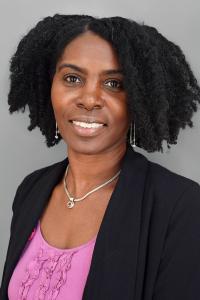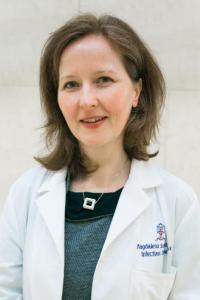How Do People Become Doctors or Researchers?
How Young People Can Inspire Each Other to Discover Their Unique Interests
As young people enter into their adult lives, they must find out what they are truly passionate about. Learning from others who have already done this can be a great way to discover new interests, make connections, and get involved in your desired field. Let’s take Saba Ahmed for an example: a medical student at Pacific Northwest University and a recipient of the 2023 Research and Mentorship Program (RAMP) Scholarship through the HIV Vaccine Trials Network. Curious as to how she came into the program and what led her to the specific research and field of medicine she contributes to, we conducted an interview to learn more. In this interview, Saba describes her journey into the medical field, her interests in clinical medicine and research:
Growing up, my family's from Bangladesh, and so I was like a first-gen student. And we would go to this health clinic [that would] serve underrepresented people and communities, maybe people who are undocumented or they don't have insurance, etc. And they would [translate] different languages and just cater to all different types of communities.
Saba explains how her exposure to this clinic inspired her to pursue HIV prevention services and research, including this summer through the RAMP scholarship and under the mentorship of Drs. Sobieszczyk and Castor in the Columbia Research Unit (in the Division of Infectious Diseases at Columbia University). A lot of the time, people are inspired by the people and experiences closest to home. This can be a great way to determine what you want your future to look like. We wanted to learn more about the people in Saba’s life who impacted her – who she looked to for inspiration.
... there is a specific doctor, a family doctor that was always really kind to my family and just I looked up to. I basically went to him until I was 18 and it was just really inspirational because I saw the way he interacted with the patients and just, you know, looked outside of their barriers and just treated them as a human. And not every physician [or health care provider] is like that. And I kind of made it a goal to pursue medicine and provide that type of care to communities and specifically lower socioeconomic or underrepresented communities. So that's kind of where my journey began.
We were amazed how this one doctor contributed so much to her interest in medicine. With so many branches of medicine, how did she discover her specific interest in the field HIV? We probed for details:
I actually got interested in HIV work as an undergrad,” she continued, “I went to school at Indiana University-Purdue University Indianapolis and worked at the Damien Center [a service organization in Indiana for people living with HIV], where I did some volunteer work. Basically, you would go to these classes and learn about PrEP [pre-exposure prophylaxis for HIV], AIDS, HIV, other STIs [sexually transmitted infections], and they would give you information that you can take to your campus, like little sessions. So that's kind of when I got introduced to HIV. [In] my first year of medical school, I am basically still learning.
It was clear to us that her school served as an environment where she was able to hone in on her specific interests in health. By utilizing all of the resources available to her and pushing herself to try new things, she discovered her passion for HIV prevention and sexual health. We thought about how other young people could do the same – institutions of education can expose young people to all kinds of new opportunities and experiences through clubs, organizations, classes, and events. After discovering her interest in this field, Saba was able to connect with a mentor at the University of Washington who helped guide her to apply to research programs. She got accepted to the RAMP program and was able to begin this work.
This is actually my first project, with RAMP, where I'm actually doing some HIV research.” She elaborates on how her experiences shaped her academic interest. “When I was looking through the list of projects, this project specifically stood out to me because it looks at Long COVID and COVID in general, and I graduated undergrad in 2020. So that's when COVID kind of hit, and I want to do infectious disease. So obviously COVID plays a big role in a lot of these infectious diseases and illnesses in general. And since I do want to serve underrepresented communities, I feel like this is a great way to combine both of them together.
We then asked her to explain more about the specifics of her project, which is titled, “Sexual health satisfaction and risk perception regarding HIV and STI acquisition among people with and without post-acute sequelae of SARS-CoV-2 (PASC) in predominantly Black and Latino communities”. In other words, she aims to determine whether having PASC, or “Long COVID”, can affect the association between how people perceive risk, risk behaviors and sexually transmitted infections (STIs) or HIV. People with Long COVID experience many and variable symptoms after recovering from their acute illness. Saba explained that COVID-19 is a relatively new disease and many aspects are still being researched and studied.
Saba then went on to explain how she plans to combine research and clinical medicine as she continues her training. When discussing her aspirations for the future, she says:
My ultimate goal is to be an infectious disease physician and specifically work with patients with HIV or AIDS in underrepresented communities. Since I'm going into my second year [of medical school], I have two more years and then I [hope to do] an internal medicine residency, and then a fellowship in infectious disease. So hopefully throughout that time I learn more about HIV and just working with that population and how to better serve them ultimately.
Overall, her research is extremely relevant and important. As she states, “Medicine is a lifelong journey,” meaning that there is always more knowledge to be discovered and ways to improve the healthcare system. We were inspired by her story and her unique path into medicine. Throughout our interview, Saba expressed her eagerness to learn and how it pushed her to pursue her interests. Her story serves as a great example of how passionate individuals are the driving force for the future of medicine.

